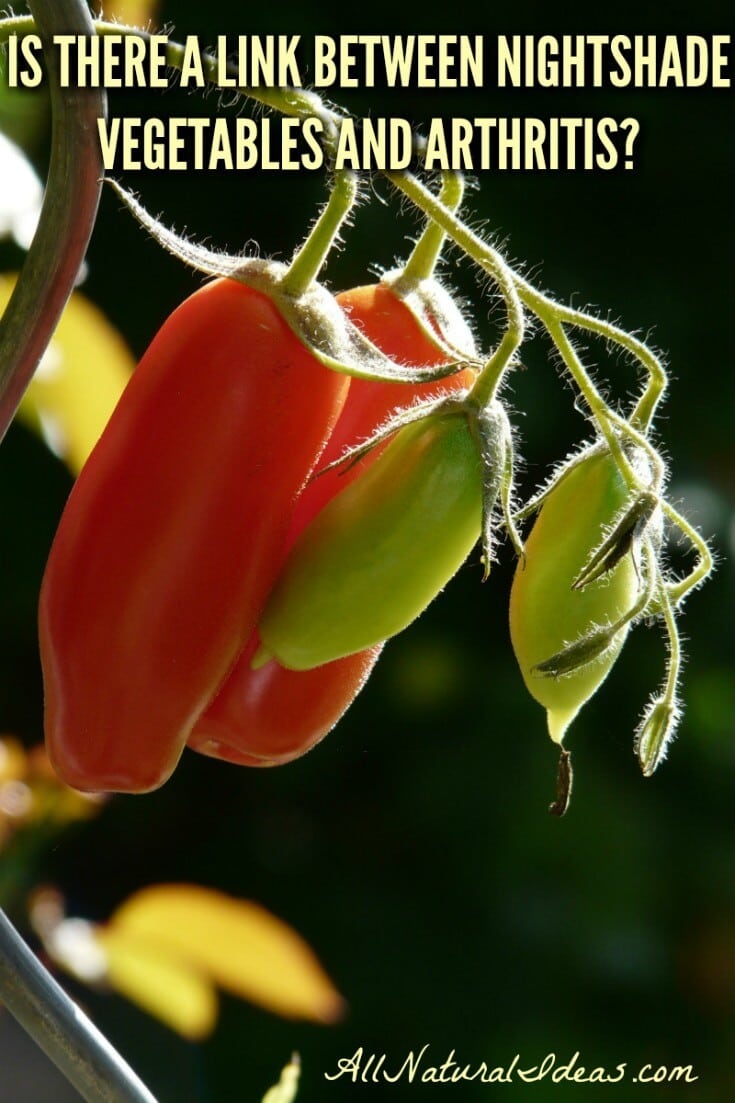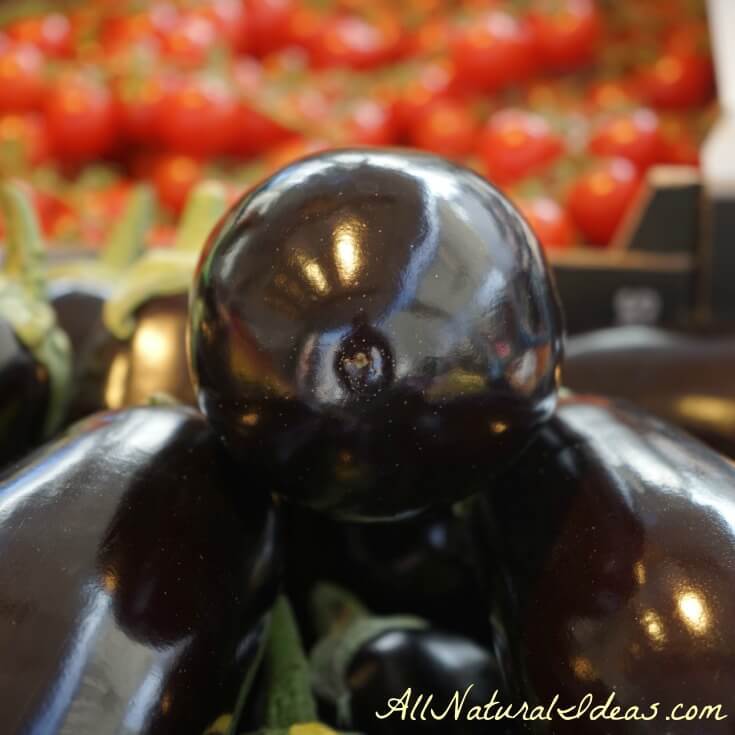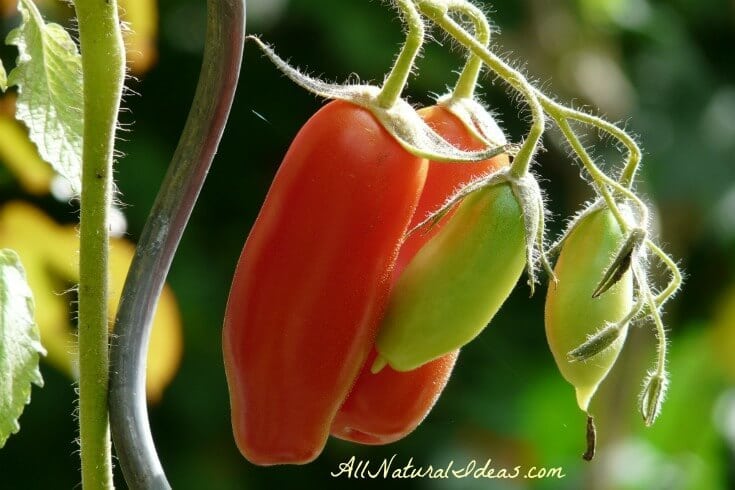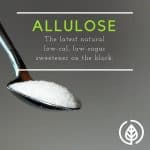Is there a link between nightshade vegetables and arthritis? Or, is it just a myth? Let’s take a look and see what the research has to say.

It’s one of nutrition’s biggest battles … do nightshade vegetables cause arthritis?
In this corner, we have the Arthritis Nightshades Research Foundation, which believes nightshade vegetables—tomatoes, potatoes, eggplant, chili peppers (and tobacco leaf)—are directly responsible for causing arthritis.
In the other corner we have the Arthritis Foundation, which states that one of the biggest nutrition myths is that nightshade vegetables cause arthritis.
So which is it … who is going to merge victorious in the nightshade food fight?
Let’s take a look at what each side has to say about nightshade vegetables and arthritis to support its own belief. Then perhaps we can determine if nightshade vegetables do or do not contribute to arthritis.
Do Nightshades Contribute to Arthritis? The Case for “Yes”
Dr. Norman Childers, chairman of the Arthritis Nightshades Research Foundation, is the author of the book, Arthritis — Childer’s Diet Stops It!
Childer’s book suggests that the root cause of arthritis is diet. One of the biggest contributors to this inflammatory disease of the joints is nightshades. The Nightshades Research Foundation (of which, Childers is chairman) maintains that Childer’s book examines over 100 years of documented research on nightshades.
Nightshades are closely related botanically to so-called ‘Solanaceae’ family of plants. These plants include the deadly nightshade plant. The nightshade plant contains toxins in its leaves, which could kill humans and pets if the fruit (berries) of the tree are consumed.
The book claims to be based on 50,000 case histories involving people that have cooperated with a nightshade-free diet of 1-20, or more years. “Cooperators rigidly on the diet have recovered completely or shown marked improvement, some leaving canes, walkers, and wheelchairs. [These] [p]eople may live to 100 Years!,” claims the book’s synopsis.
One research study that does support the claim that solanaceae plants are harmful to human health is published in Phytochemistry. The steroidal alkaloids in so-called nightshade vegetables “are considered anti-nutritional factors because they affect the digestion and absorption of nutrients from food and might even cause poisoning,” says the study researchers in the abstract. Furthermore, the authors note that it’s been known for over 200 years that nightshades possess toxic properties to humans.

The Link Between Nightshade Vegetables and Arthritis
Despite the researcher’s’ conclusions, we may only be able to speculate that the anti-nutritional factors directly lead to arthritis. In other words, it doesn’t sound good that nightshades have properties that interfere with digestion. But does that fact lead to direct proof that nightshades cause arthritis?
Childer’s claims that solanines (and capsaicin in garden peppers) are drug-like substances that may cause “paralytic-like muscle spasm, aches, pains, tenderness, inflammation, and stiff body movements.”
Another problem with nightshades, according to Childers’ book, is that they contain a very active form of Vitamin D. You might think that’s a good thing, considering most people are deficient in vitamin D. But this highly potent form of vitamin D (calcitriol) may cause hypercalcemia and soft tissue calcification. Nightshades, says Childres, can cause calcium deposits in tendons, ligaments, cartilage, cardiovascular tissues, kidneys and skin.
What Does the Arthritis Foundation Think About the Link?
In an article on the Arthritis Foundation website titled “Arthritis Food Myths,” one of the myths listed is: “Nightshade Vegetables Aggravate Arthritis.”
The author claims that solanine has been branded a culprit in arthritis pain, “But no formal research has ever confirmed the claim, and the vegetables contain essential nutrients.”
This counterclaim also points out the fact that a study in the Journal of Nutrition concluded yellow and purple potatoes contained anti-inflammatory properties. Not only is it a myth that nightshades cause arthritis, says the author, but “People with arthritis may [even] benefit from nightshades.” The author concluded that it’s possible some people may have sensitivities to certain vegetables.
So who should we believe? Would an organization called the “Arthritis Nightshades Research Foundation” exist just for the sake of ruining the reputation of tomatoes, potatoes, eggplants and peppers?
What does the Arthritis Nightshade Research Foundation say to counter the claim that no research exists proving the connection between nightshades and arthritis?
“Unfortunately, there are so many important industries (drug, medical, agricultural, and marketing) adversely affected by these studies that about the only source of research funds is through devoted private contributors,” claims the foundation.
Conclusion: Bio-individuality should be considered
For every article or blog asserting that nightshades leads to joint pain or arthritis, there’s one that claims that this is a myth. Perhaps part of the problem is that this debate cannot be conclusively solved because everybody has a unique biochemistry. While one nightshade vegetable may be neutral or even beneficial for one person, it could potentially cause allergies, and perhaps, inflammation in another person.
As the Roman philosopher and poet, Lucretius, is believed to have said over 2000 years ago, “What is food for one man may be bitter poison to others.” Perhaps that’s where we should conclude with this highly-contentious food debate on whether there is a link between nightshade vegetables and arthritis.






